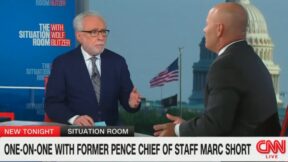DeSantis Ratchets Up War With Mickey, Threatens to Build Prison Next to Disney World and Meddle with the Monorail
Florida Gov. Ron DeSantis (R) is ratcheting up his war with Mickey to absurd new levels this week, after his efforts to take over Disney World’s special taxing district hit a major legal snag, by threatening to punish the company by taking various retaliatory actions, including building a state prison next to the park property.
“Come to think of it now, people are like, well, there’s, what should we do with this land?” said DeSantis regarding property adjacent to Disney’s 25,000-acre Central Florida parcel. “People have said, you know, maybe, maybe have another — maybe create a state park. Maybe try to do more amusement parks.”
“Uh, someone even said, like, maybe you need another state prison,” DeSantis continued with a chuckle. “Who knows? I mean, I just think that the possibilities are, are, are endless.”
Keep in mind, this whole mess started with a milquetoast objection by Disney — in the form of a toothless press release issued by the then-CEO Bob Chapek — regarding the Parental Rights in Education bill (dubbed “Don’t Say Gay” bill by many of its critics) after it passed. Liberal groups had already fundraised and secured pro bono legal counsel for the lawsuit filed the day DeSantis signed the bill. Disney had no role in those efforts and donated no money to that or any other legal challenges. It is noteworthy that many other companies — including the Rosen hotels that are a frequent site for many Florida GOP events in Orlando — publicly attacked the bill before it passed with far harsher language than Chapek.
Never mind the facts when there’s a culture war to fight (and DeSantis’ nascent presidential campaign to promote). The GOP-controlled Florida legislature rushed ahead with an ill-conceived bill that would have repealed outright the Reedy Creek Improvement District (RCID), the special taxing district for Disney’s property that stretches across Orange and Osceola County.
As I’ve pointed out repeatedly over the past year-plus that this charade has dragged on, RCID is not a tax break for Disney, but an extra tax in addition to the taxes it pays to both counties, a roughly $160 million annual tax which the company willingly pays in order to maintain a higher level of services, infrastructure, etc. than the counties could provide, then or now.
RCID was viewed by the governments of both Orange and Osceola as essential for properly managing the Disney property, both at the time it was created in 1967 and in the current day, and was not a structure that either county wanted to unravel. The Florida Legislature’s own analysis in 2004 came to a similar conclusion.
There are some weedy legal issues within the Florida Statutes regarding prohibitions on repealing special taxing districts without the consent of the landowners (which Disney absolutely did not give here) as well as a pile of First Amendment issues, as numerous legal experts and returning Disney CEO Bob Iger have pointed out. Even if the repeal of RCID were legal under Florida law (which it is not), the government cannot take an otherwise legal action against a taxpayer as retaliation against the exercise of that taxpayer’s free speech rights.
It was neither common sense nor respect for constitutional rights that caused DeSantis to back off his Cinderella Castle coup attempt, but the unyielding existence of RCID’s municipal bond debt — more than $1 billion — a debt that would become the debt of the county taxpayers if RCID was dissolved. Orange County Tax Collector Scott Randolph estimated that this would raise taxes in his county between $2,200 and $2,800 per household of four.
The scrambling to save face for the governor led to a new bill that kept the main structure of RCID intact and took control of the board away from Disney and granted that appointment power to the governor.
But before the new DeSantis-appointed board could seize the reins, Disney and the existing RCID board entered into a new development agreement, essentially freezing the existing system in place, prohibiting the incoming board from using the Disney name or characters, and otherwise sharply limiting their power. There has been a lot of complaining from Team DeSantis about the move, but it was done at a publicly-announced, open-to-the-public RCID meeting, that was recorded in the county public records.
DeSantis and his hand-picked board members didn’t appreciate Disney’s clever legal maneuvering, to say the least, and have repeatedly and publicly vowed retaliation. This again highlights the colossal free speech issues here — was this DeSantis puppet board really planning to, say, deny a building permit if the upcoming Lilo & Stitch live-action film has a gay alien?
Monday’s suggestion that the state build a competing theme park or a state prison next to Disney was viewed as comical by some commentators, but it’s really a wild thing to observe the governor digging deeper into his threatened free speech retaliation.
The threat to build a prison next to Disney is in some sense an empty threat, since one of the main reasons the company purchased such a large parcel of land was to create a buffer zone around their theme park and hotel properties — but it does raise the question of whether the governor was threatening that such state prison would be poorly run and/or secured, thereby creating a public safety hazard. But that would contradict the governor who is arguing to the GOP base he’s less drama than former President Donald Trump by claiming he’s a competent executive, right?
DeSantis added more threatened retaliation during remarks Monday afternoon, as reported by Politico’s Gary Fineout, including adding new state inspection requirements for the theme park rides and monorail train system that would apply to just Disney, and not its competitors like Universal. He also openly contemplated finding a way to raise Disney’s taxes.
Disney’s own building codes (referred to as the “EPCOT Codes”), inspections, and other safety procedures meet, and in many cases exceed, all existing state or federal codes — plus Disney’s own very strong market incentives to keep their guests happy and safe — so there isn’t a documented public safety rationale for this threat of additional government meddling in a private company.
It is quite remarkable to see a Republican elected official, who previously touted free speech, free markets, low taxes, and reduced government regulation as conservative values now attack a company with threats of raised taxes, loss of control over its own land and business operations, and other punitive measures.
There are valid criticisms of Disney as a company, and parents are certainly within their rights to decide if the company’s theme parks and entertainment products are appropriate for their children. But it should never be government’s role to police that creative product or the company’s political criticisms by threatening retaliation through official government actions.
Watch above via CNN.
This is an opinion piece. The views expressed in this article are those of just the author.




